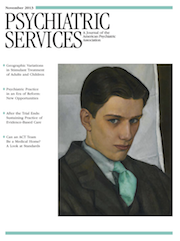To the Editor: For years, proponents of involuntary outpatient commitment have put forth the euphemistic term “assisted outpatient treatment” in an apparent effort to render the coercive aspect of the procedure less obvious to the casual observer. Most recently in these pages, Torrey (
1) used a book review as a forum to continue promoting this intervention.
According to Webster’s online dictionary (
www.merriam-webster.com), the verb “assist” used as a transitive verb means “to give usually supplementary support or aid to”; used as an intransitive verb, it means “to give support or aid.” The explicit implication of these meanings is that the “assistance” provided is in the furtherance of a goal sought by the receiver of the assistance.
The earliest use of the term “assisted outpatient treatment” in this journal appears to have been in September 2001 (
2). In that article, the authors noted that the term was devised by proponents of Kendra’s Law in New York, a response to a tragedy in which an individual with serious mental illness killed a woman by pushing her into the path of an oncoming subway train. Here is what the authors of that article wrote: “In many states a take-no-prisoners battle is under way between advocates of outpatient commitment—who call this approach assisted outpatient treatment—and its opponents—who use the term ‘leash laws.’ ” It is clear to me—and appears to have been clear to the authors of that article—that use of the term “assist” in this regard was a deliberate attempt to make the intervention seem less coercive and therefore more palatable.
Somehow, the “assisted outpatient treatment” proponents have been winning the language battle such that the term has replaced the more accurate “involuntary outpatient commitment.” This defines Newspeak, the language in Orwell's masterpiece 1984, in which some terms “meant almost the exact opposite of what they appeared to mean.”
If we are honest with ourselves, with our patients, and perhaps most importantly with our policy makers, we ought to recognize and oppose this linguistic sleight of hand. Calling a coercive, court-mandated treatment order “assisted,” as if it were a cane or a walker used to assist a person with impaired balance who wants to be able to safely navigate his living room or her sidewalk, is inaccurate and misleading. We are better than this. Whether there is a role for involuntary interventions should be debated honestly and openly and without trying to hide the nature of the interventions that we are proposing. Let’s just call it what it is.
Acknowledgments and disclosures
The opinions expressed are those of the author and do not necessarily reflect those of the Maryland Mental Hygiene Administration or Springfield Hospital Center.
The author reports no competing interests.

